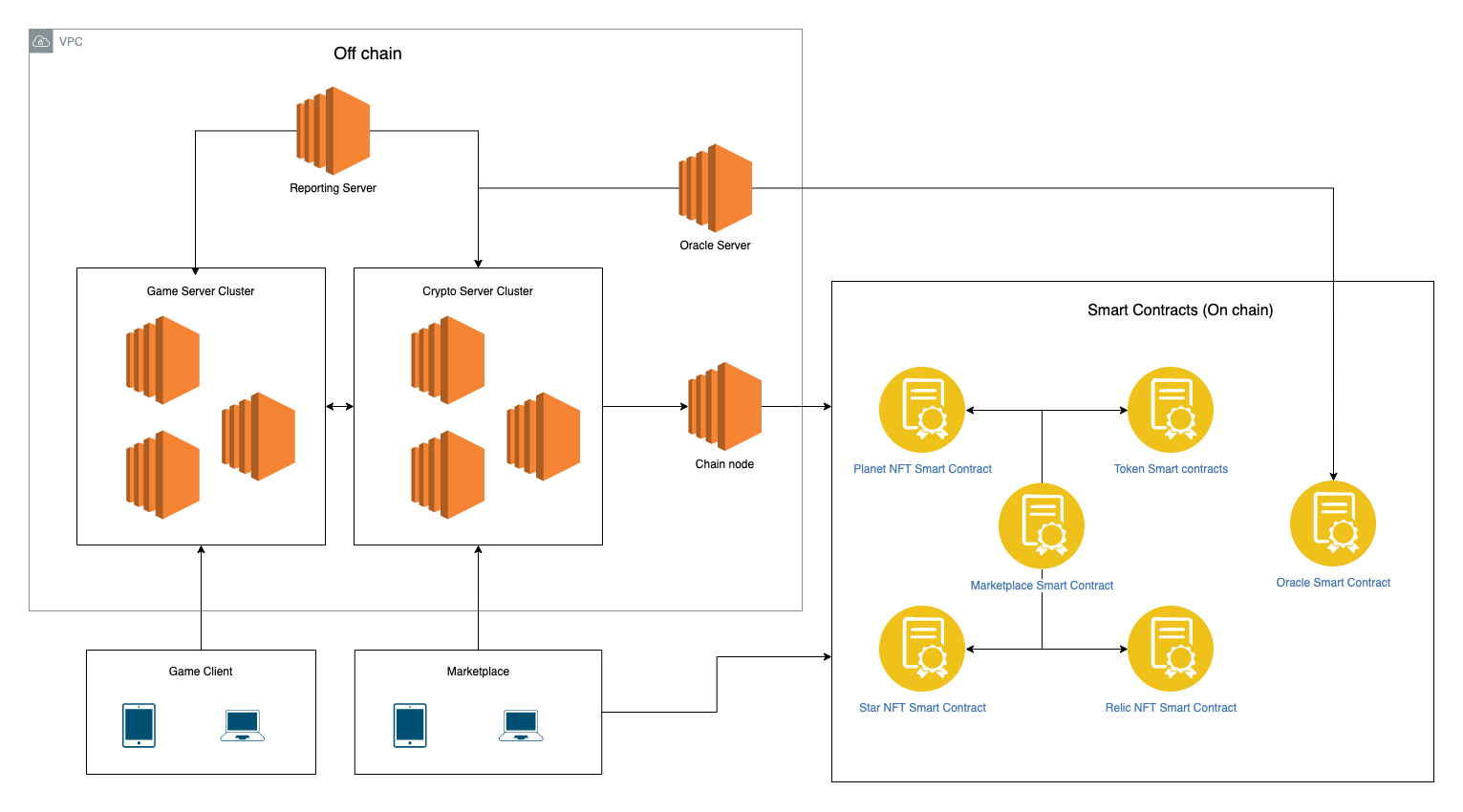Blockchain and Tech
Sacraments: the Technology we're using

Thanks to the continuous growth and maturation of the crypto ecosystem, the gaming industry has found a solid place in the world of open blockchains. Cutting edge concepts such as token sales (TGE), NFTs, semi-fungible tokens, staking and layer-2 blockchain architecture all boast the potential to optimize cost efficiency and incentive distribution. A wide range of networks can provide diverse microservices governed by community standards, enabling quick, frequent and reliable delivery of large, complex applications and technology stack evolution. We are currently engaged in the process of tech stack selection for our game prototyping, with the ultimate goal of decentralizing and minimizing transaction costs.
Architecture
The continuous inflation of Ethereum gas fees is a contentious issue. Although Ethereum 2.0 boasts a proof-of-stake system that simplifies cryptographic work, its high volatility is still a major entry barrier for new users. Luckily, Layer-2 blockchain platforms are a great solution for game developers, as they provide gas-free platforms and NFT smart contracts.
When we began our project, we first adapted Polygon as our Layer 2 blockchain solution while always keeping an eye for the possibility to integrate other solutions. This opportunity arose in Q4 2023, when we migrated to the Ronin Blockchain. The Ronin Blockchain, also a Layer 2 blockchain, offers a specific focus on gaming.
Game Core
Frontend: Unity. We have chosen Unity for our frontend game development. Although Unreal boasts better rendering, performance and scalability, its blockchain game tech stack has little to no support. Moreover, Unreal’s pricing model is 5% royalty of overall sales, which may not fit with the blockchain ecosystem. Thus, we have selected Unity, and hope that Unity can provide better multithreading solutions in the near future.
Mix of centralized servers with Blockchain
To give users the best game experience, we will introduce centralized server clusters to handle most of the game logic. Only assets-related logic will be on-chain.
Centralized server for
Game Logic Validation to avoid cheating in progression
Blockchain data indexing for quick filtering and sorting.
Planet World Generation based on NFT
PVP Matching
Galactic Arena event hosting
Galaxy progression
Decentralized blockchain for
Planet, Apostle, Relic, and Star NFTs
NFT Asset generation and Genes Transform like Chronomerging, Armageddon.
Token earnings and usage (Token recycling mechanic)
Galactic Arena Rewards
Treasury
Governance
Apeiron will give players decision-making power over the flow of the greater narrative, in a fashion similar to that of Dungeons and Dragons. Voting takes place through our decentralized autonomous organization (DAO), where token owners can vote on Galaxy Progression, use of revenue from token issues, game operations, game asset allocation, and token buy-back schemes. In principle, every Apeiros Token holder can become a DAO member and vote on proposals, although membership is optional. DAO implementation will be handled by an external third party such as Snapshot.
Server Architecture

We will adopt K8s solution to provide high availability and reliable off-chain server.
Off-chain server security and integrity are as important as on-chain. We will adopt different measures including but not limited to security auditing, Intrusion detection system, VPC, firewall, and continuous backup.
Different levels of testing including but not limited to unit test, integration test, load test, and stress test, will be carried out to make sure the initial launch of the game will be high quality and less bug-prone. This also applies to future game updates.
Smart contracts will be kept clean and simple, with upgradable features for bug fixing and improvement. All smart contracts will be audited by Blockchain Security Audit Company.
Last updated